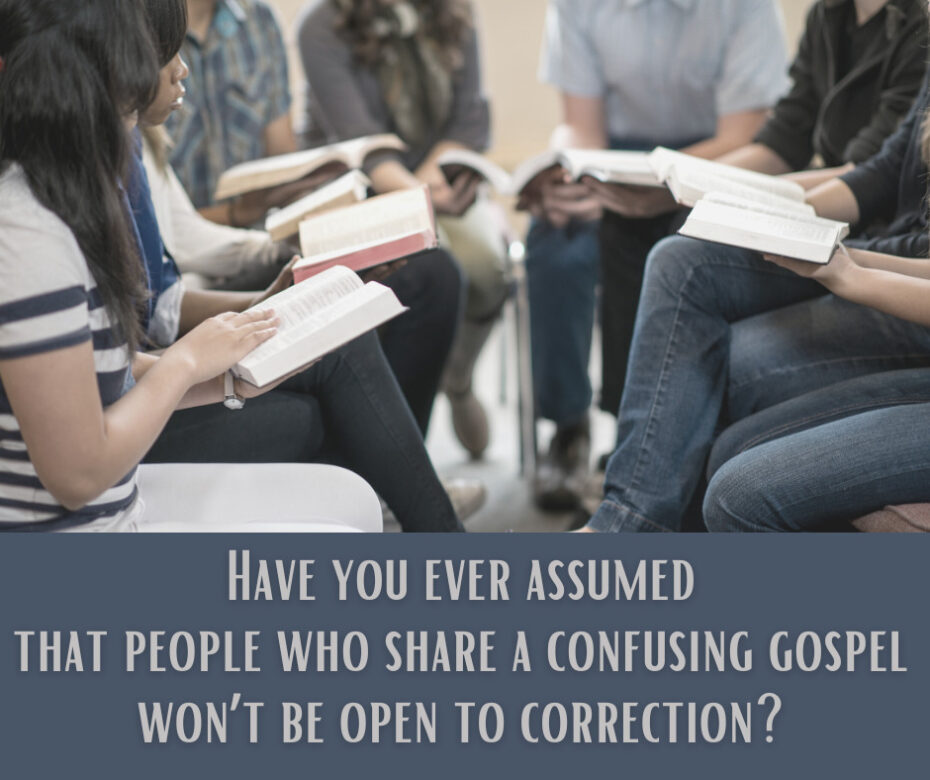Most of us are familiar with the Gideons. They are responsible for handing out millions and millions of Bibles. The people involved in this organization are laymen who devote their own time and resources to print and distribute the Word of God. When they give out these Bibles, they often engage in evangelism.
They are an ecumenical group, with people coming from many different denominations. Not surprisingly, their gospel presentation reflects the diversity within their ranks. In the Bibles they hand out, there is an explanation of how to be saved from hell. It involves a sinner’s prayer and an explanation of repentance. It certainly does not include assurance as part of that message. Almost always, when you hear somebody in the organization describe how they engage in evangelism, they will say they lead a lost person in the sinner’s prayer after that lost person realizes they are a sinner. Free Grace people cringe when they hear such things, realizing that, at the very least, the message is a confused one.
It is easy to understand why the Gideons proclaim such a gospel. It is generic and includes verbiage that many different denominations use and are comfortable with. It does not get into issues that divide, such as assurance and the eternal security of the believer, because that will lead to division. Their main goal is to hand out Bibles. They want to get the Word of God into the hands of as many people as possible.
But there is another reason for this one-size-fits-all gospel. Most Gideons have never considered the possibility that the gospel they present is not correct. Getting people to see that they are sinners, getting them to repent, and getting them to say the sinner’s prayer must be good things. It is all that these Gideons have ever heard. As far as they know, there is no other option. Plus, they are doing God’s work by handing out His Word.
Recently, I received a phone call from a good friend who is a Gideon. He has been exposed to GES material, and he told me that he is concerned about how most Gideons present the gospel. He asked if I would come and give a presentation of the gospel of grace to the leaders of a local chapter over dinner. I accepted. There were six leaders present.
After dinner, I spoke for about 15 minutes. I explained that nobody in the NT ever was saved from hell by saying a sinner’s prayer. I pointed out that repentance is not a requirement for eternal life either. It never occurs in the Gospel of John, and Jesus did not tell Nicodemus or the woman at the well that they needed to repent. Paul did not tell the Philippian jailor he needed to repent either. Instead, all that these unbelievers needed was simply to believe that Jesus was the Christ who gives eternal life. The very offer involves assurance of salvation, as the word eternal indicates. Believing simply means we are convinced of what Jesus says, nothing more.
It was a little scary doing this over dinner. I was their guest, and I was attacking how many of them conduct their ministry. How did these six leaders respond? All were gracious. Three of them expressed how glad they were that I had come. Perhaps they disagreed with what I said but did not think it was important. Perhaps they did not understand what I was trying to communicate or thought I had done a bad job of it. Perhaps they were angry at me but, in light of Southern hospitality, they did not express it!
The other three, however, were very positive about what I had said. Of course, my friend already knew the issues and their importance. He expressed his gratitude for the opportunity these leaders had to hear about grace and to consider how they presented the gospel. Another of the leaders said he had never heard such things before and wanted to hear and study them more. He had never considered that he might be giving a distorted or false gospel.
A third leader went beyond what I had said. He talked to me after dinner, saying that he realized that when the NT talks about repentance, it is talking to believers. He gave the example of Rev 3:20 and said that he often hears it used in a gospel presentation but now realizes it should never be used that way. I was very excited about his insight.
This was a learning experience for me. Maybe it will be for you as well. When we run into people who distort the gospel, we must remember that there are all kinds of people out there. Indeed, some have heard the message of grace and have rejected it. But there are also people out there who have never heard it. They have never had anybody explain its importance.
I have no idea how this small group of people will act upon what I said. Some people will say that I was wasting my time. I disagree. When the Lord and the apostles spoke to groups, there were all kinds of people present. Some were closed to the truth. Others were open. We need to remember that the people we come into contact with are a mixed bag.


